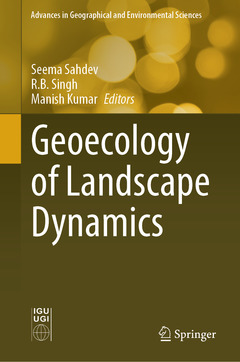Geoecology of Landscape Dynamics, 1st ed. 2020 Advances in Geographical and Environmental Sciences Series
Coordonnateurs : Sahdev Seema, Singh R. B., Kumar Manish

This book provides an overview of the ecological indicators of landscape dynamics in the context of geographical landscape integration. Landscape dynamics depicts every change that occurs in the physical, biological, and cognitive assets of a landscape. To understand and interpret the complex physical, biological, and cognitive phenomena of landscapes, it is necessary to operate conceptually and practically on a broad range of spatial and temporal scales. Rapid land use changes have become a concern to environmentalists and planners because of their impacts on the natural ecosystem, which further determines socioeconomic dynamics. In this regard, the book discusses case studies that share new insights into how landscape patterns and processes impact small creatures, and how small creatures in turn influence landscape structure and composition.
In turn, the relevant aspects of land use and land cover dynamics are covered, and the multi-faceted relationship between the substrata and ecological community is highlighted. The book is unique in its focus on the application of spatial informatics such as automatic building extraction from high-resolution imagery; a soil resource inventory for meeting the challenges of land degradation; hydrological modeling; the temporal variation analysis of glacier area and the identification and mapping of glacial lakes; morphometric analysis of river basins; and the monitoring and modeling of urban sprawl, among other features.
Reveals the human dimensions of sustainability through its cultural ecological approach
Contributes a spatio-temporal perspective for integrated assessment through landscape dynamics
Covers spatial informatics techniques to contribute to the Landscape Decision Support System (LDSS)
Date de parution : 03-2020
Ouvrage de 381 p.
15.5x23.5 cm
Disponible chez l'éditeur (délai d'approvisionnement : 15 jours).
Prix indicatif 158,24 €
Ajouter au panierDate de parution : 03-2021
Ouvrage de 381 p.
15.5x23.5 cm
Disponible chez l'éditeur (délai d'approvisionnement : 15 jours).
Prix indicatif 158,24 €
Ajouter au panier


